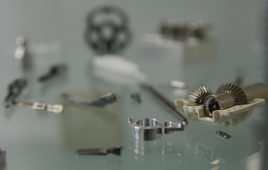Before Jeff Dargatz was a small CNC business owner, he was a farm boy. He went to a small school in South Dakota, and when he graduated, he didn’t really have any direction. “My dad said, ‘Just get any job,’ so I went to work at an implement dealership [selling farm equipment parts].”
After a while, Dargatz decided he wanted to move to Watertown, a growing city in South Dakota with more opportunity. “I wanted to look for work there and apply for job service.” In 1988, Dargatz explains, there was a shortage of machinists and the Mount Rushmore State launched a 2-month vocational program to help businesses get machinists working and in the job market. Dargatz qualified financially for the program and decided to enroll. “I had never thought of machine tooling as a career choice, but it was a good opportunity.” He says that first class was small, “just me an one other guy.”
After 7 weeks in the program, Dargatz starting filling out applications for machine shops in the area. He accepted a position at Western Machining, starting the Monday after his graduation from the vocational school. The shop continued his education, he says, by insisting that all machinists learn all aspects of the process.
After a few months, Dargatz says he still wasn’t really sure this was what he wanted. “I struggled,” he says. Then, one day, Dargatz was working on a handscrew and something clicked. “I still didn’t know much, but I started to get excited about the product and the projects.” From there, the shop put him in more and more challenging positions.
Still, Dargatz wasn’t convinced of the career path. After working at Western Machining for 5 years and then decided to try something else – a garage door installer. “I almost killed myself on a ladder,” he laughs.
So he went back to machining, taking a job at Smith Equipment (now part of ITW Corp.), where he worked for 15 years. During that time, Dargatz went from the nightshift floor operator to CNC department manager. He would recommend new equipment purchases and write programs for the machines.
Dargatz says he often took his work home with him. “I’d lay up at night thinking about how to best manufacture the new designs or solve a problems. Then one day, I thought, ‘Why not just do it for myself?’”
Dargatz knew there were small jobs out there that his company wasn’t able to take on, and he thought he could fill that niche during his off hours. “I’d always liked Swiss machining best,” he says. However, the capital equipment is highly expensive. To launch his business he needed a $250,000 loan.
“We went to our bank of 20 years, first,” says Dargatz. “We had some equity from our house, our savings, good credit, and a business plan.” The bank turned him down.
So Dargatz moved to Plan B. He went to the bank that held his home mortgage, and the loan officer gave him some options. “He told us, ‘Look, I can get you a loan for half, if you go to the small business administration for the rest.’”
The small business agency required Dargatz to jump through a lot of hoops, but he eventually secured that loan and the bank loan, opening the doors to his new business in January 2008.
At first, he planned to keep his day job and work on the new business during his off hours. But a hiccup came once he had taken out the loan: His company decided to eliminate his management position and wanted to put Dargatz back on the floor. “I decided to take my severance instead, and focus full time on my new business. I didn’t have a single customer lined up.”
Precision Tool Inc. was born. “We did pretty well for the first few months,” says Dargatz. “We had one fully automated 5-axis CNC machine, we gained a few clients, and things seem to be coming together.” In fact, Dargatz says those first few months were almost charmed. “Of course we had a lot of obstacles, but it seemed like every time I needed something, there it was – we felt blessed.”
What came next was the worst recession in history. “In September 2008, it seemed like in one day everything dried up,” Dargatz says. “All of my customers put projects on hold, canceled orders, or shut down – you could say they ran for the hills.”
Precision Tool, less than a year out of the gate, was close to bankruptcy. But Dargatz wasn’t ready to give up.
He belonged to a website that allowed companies to post machining jobs and accept quotes for projects. On this site, he says, “I had seen several posts from a company in Pennsylvania doing military work. The jobs posted were far to complex and intricate for my equipment.”
But because the company was one of very few still posting projects, Dargatz took a chance. He called up the poster, and told her, “I can’t do any of the jobs you have posted. Do you have any other projects that I can do?”
Mary, who was the purchasing agent at the Pennsylvania firm, did have some other jobs and gave Dargatz a small try out. “It was for a retaining ring and she only needed 1,000 pieces.” But Dargatz was up to the challenge. “I made the parts, sent them off, and she called me to do more work.”
One thing clients respond to, says Dargatz, is his customer service commitment. “I put a lot of value on work ethic and pride myself that even though I’m remote for a lot of clients, I can get parts to them faster than others.”
Dargatz says he’s proud that his parts are used in signal jamming devices used to protect soldiers from IEDs, in the new military vehicle called the JLTV, in space, and in countless radio frequency and microwave systems. Dargatz also has some medical clients. One in Wisconsin makes CO2 detection devices used by emergency responders for triage. But Dargatz says he often never knows how his parts are used. “I know the basics, sure – but I’m more concerned with the specs of the parts.”
Dargatz likes it best when he can help companies solve a problem. He recalls a customer that came to him with a device that included a reflector, one that other machine shops couldn’t seem to get right. “His previous supplier had closed his doors and his business was teetering on getting these parts,” says Dargatz. The reflector needed to be a perfect elliptical shape but, as Dargatz explains, “he had already sent it to several CNC machine shops and they couldn’t meet his needs.” When Dargatz got the job he spent several days digging into the design trying to make it perfect. “It took me a long time to come up with the code,” he says. But once Dargatz had finished a prototype and sent the part to the client, “he was thrilled.”
From 2008 to 2010, Dargatz was able to add two more machines, get his wife to quit her job to take over shipping and the books, and hire a high-school kid to run the equipment in the evenings (that student has since graduated and is now married).
To keep up with demand, Dargatz runs his machines from 6 a.m. to 9 p.m. every day. He “doesn’t do walk-ins,” and not much of his business is local. He recently moved to a larger shop in Watertown that has additional capabilities and room to expand.
Being his own boss has meant that Dargatz often has to solve his own problems. For example, the nearest maintenance service is almost an hour’s drive and the next closest is in Minneapolis – more than 200 miles away. “I had to force myself to learn CNC maintenance.” The Internet is also a huge source of success for Dargatz’s business. “I use it to prospect jobs and learned machine maintenance.”
Dargatz’s biggest challenge however, is finding a legacy. “I’m a one-man show and I don’t want to do that forever.” Ideally, he says he’d like to bring in a younger partner and teach him the business, and then get him to take over the business. Dargatz says he has about 15 good years until he retires. “I don’t expect anyone to become an expert overnight.”
Until then, however, Dargatz says his work is everything he’s ever dreamed about. “It’s so rewarding to own my own business, to be self employed. It’s what my dad did, and I wanted that for myself.”











